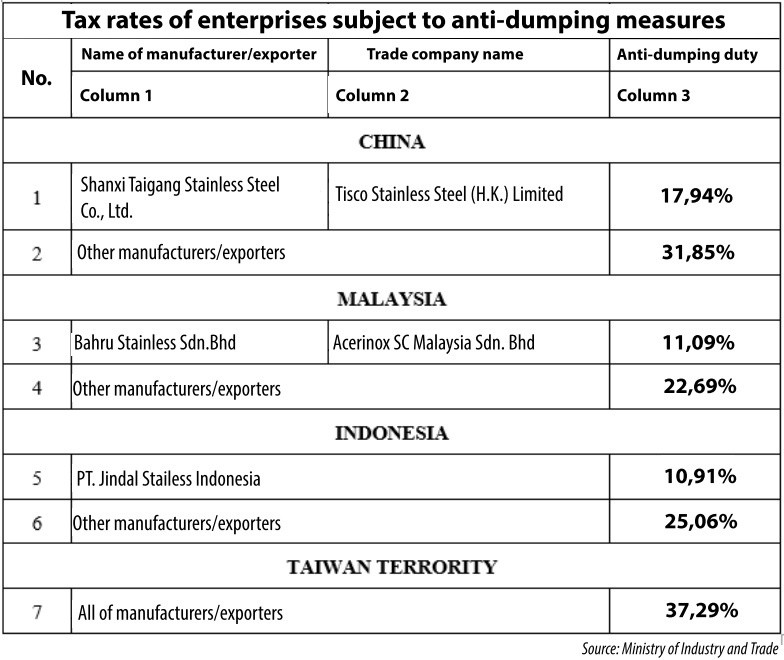South Korean group Posco VST, which owns the biggest cold rolling steel plant in Vietnam, is likely to gain benefits from anti-dumping measures on some cold-rolled stainless steel products – however, both the company and the Ministry of Industry and Trade have denied a monopolitic stance in the market.
The ministry (MoIT) earlier this month issued Decision No.625/QD-BCT on upholding the application of anti-dumping measures on some cold-rolled stainless steel products in Vietnam originating from Taiwan, Indonesia, Malaysia, and China.
Goods subject to these anti-dumping duties are cold-rolled stainless steel with rates between 10.9 and 7.29 per cent, depending on the companies and countries.

The MoIT has levied these steel products for the first time to protect domestic producers after an investigation was launched at the request of local steel producers Posco VST and Inox Hoa Binh, which enjoy a combined market share of 80 per cent.
Located in the southern province of Dong Nai with a 235,000-tonne capacity, Posco VST recorded a net profit of $21,700 as of last December, while it suffered a loss of $121,000 in 2020, according to its consolidated financial information. This result was contributed by the market recovery and partly anti-dumping measures.
Before those measures, Posco VST lamented that it suffered $74 million in losses due to imported steel products. Cold-rolled stainless steel is used to make consumer products, car parts, cooking and dining utensils, and construction materials.
Cold-rolled steel sheets also offer a variety of outstanding properties, including easy formability and a smooth, clean surface, and are used in automobiles, appliances, furniture, and many other everyday items.
According to the Vietnam Steel Association, it is difficult to export cold-rolled stainless steel due to oversupply. Meanwhile, a number of markets, including India, Brazil, Thailand, the EU, and the US, have imposed anti-dumping duties on steel from China in order to curb the flood of cheaper imports and support domestic steelmakers.
The MoIT has explained its upholding of the application of anti-dumping measures on some cold-rolled steel in Vietnam with the fact that, though the domestic industry has gradually overcome the previous damage, the growth rate remains unstable and even declines occasionally.
Posco VST rejected statements that the tax would create an exclusive position for the company as its supply could not exceed 50 per cent of the market share. “Posco’s market share has not changed too much since the anti-dumping measure was applied. Meanwhile, the market share of other domestic manufacturers tends to increase markedly over the years, with new stainless steel factories such as Nguyen Minh and Viet Quang,” a Posco VST representative said.
Nghiem Xuan Da, chairman of the Vietnam Steel Association said, “The total capacity of Vietnam’s steel rolling and drawing mills and stainless steel pipes is currently about 350,000 tonnes per year. In which, cold-rolled stainless steel products mainly account for 90 per cent. With this capacity, Vietnam can meet the demand for cold-rolled stainless steel production.”
The MoIT concluded, “There is no basis to believe that the application of anti-dumping measures increases Posco’s position in the cold-rolled stainless steel market.”
Posco, InoxHoaBinh JSC, Nguyen Minh Co., Ltd., Hoang Vu Company, and Tien Dat Stainless Steel previously sent a document to related ministries to complain that Vietnam’s stainless steel market was in a paradoxical situation, as local supply exceeds demand, foreign markets’ anti-dumping policies render exports difficult, and China continues to produce cheap and low-quality steel.
Source: VIR